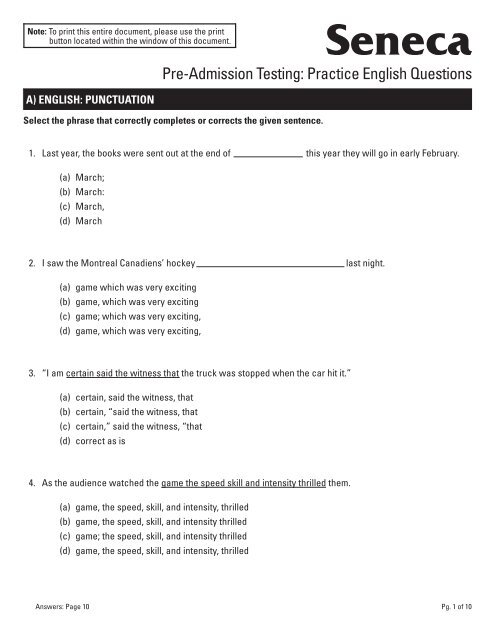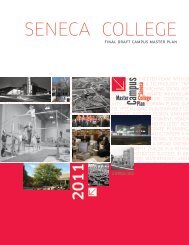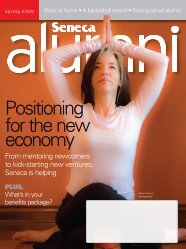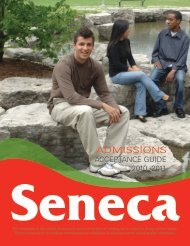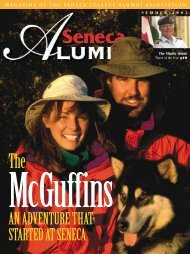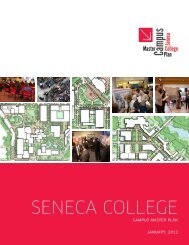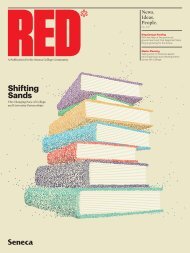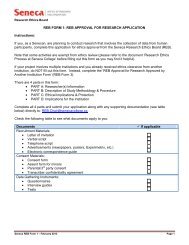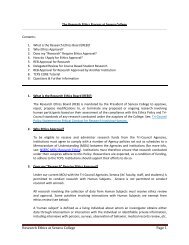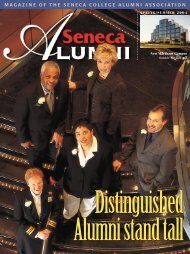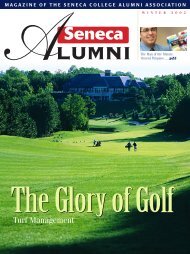Pre-Admission Testing: Practice English Questions
Pre-Admission Testing: Practice English Questions
Pre-Admission Testing: Practice English Questions
Create successful ePaper yourself
Turn your PDF publications into a flip-book with our unique Google optimized e-Paper software.
Note: To print this entire document, please use the print<br />
button located within the window of this document.<br />
A) ENGLISH: PUNCTUATION<br />
<strong>Pre</strong>-<strong>Admission</strong> <strong>Testing</strong>: <strong>Practice</strong> <strong>English</strong> <strong>Questions</strong><br />
Select the phrase that correctly completes or corrects the given sentence.<br />
1. Last year, the books were sent out at the end of this year they will go in early February.<br />
(a) March;<br />
(b) March:<br />
(c) March,<br />
(d) March<br />
2. I saw the Montreal Canadiens’ hockey last night.<br />
(a) game which was very exciting<br />
(b) game, which was very exciting<br />
(c) game; which was very exciting,<br />
(d) game, which was very exciting,<br />
3. “I am certain said the witness that the truck was stopped when the car hit it.”<br />
(a) certain, said the witness, that<br />
(b) certain, “said the witness, that<br />
(c) certain,” said the witness, “that<br />
(d) correct as is<br />
4. As the audience watched the game the speed skill and intensity thrilled them.<br />
(a) game, the speed, skill, and intensity, thrilled<br />
(b) game, the speed, skill, and intensity thrilled<br />
(c) game; the speed, skill, and intensity thrilled<br />
(d) game, the speed, skill, and intensity, thrilled<br />
Answers: Page 10<br />
Pg. 1 of 10
B) ENGLISH: PHRASING<br />
1. Which statement is worded in the clearest terms?<br />
(a) Come home on time; and then you can help your mother.<br />
(b) Come home on time so you can help your mother.<br />
(c) Come home and help your mother on time.<br />
(d) Help your mother on time when you come home.<br />
2. As a written sentence, which one is phrased the best?<br />
(a) After doing your homework, you can watch television.<br />
(b) First homework, then television.<br />
(c) No homework, no T.V.<br />
(d) Television can be watched after homework.<br />
3. Which is the most efficient phrase?<br />
(a) Bobby is at least as smart as Bill.<br />
(b) Bobby is as smart, or smarter than Bill.<br />
(c) Bobby is as smart as Bill, or smarter.<br />
(d) Bobby is no less smart than Bill; maybe smarter.<br />
4. Which sentence is not confusing or ambiguous?<br />
(a) Is there a man inside with his sister and child, named Johnny?<br />
(b) His plan to study slowly was conceived by Bill.<br />
(c) The fish followed the bait and then bit it.<br />
(d) I found a picture of my mother in the basement.<br />
Answers: Page 10<br />
Pg. 2 of 10
C) ENGLISH: VOCABULARY<br />
1. “Havoc” means:<br />
(a) Cut in two.<br />
(b) Great damage and destruction.<br />
(c) The enemy.<br />
(d) Outburst of excitement.<br />
2. “Strategy” means:<br />
(a) Something that follows from what happened before.<br />
(b) Disturbance.<br />
(c) Skillful planning.<br />
(d) Distinguishing feature.<br />
3. “Consensus” means:<br />
(a) General agreement.<br />
(b) Standard.<br />
(c) A situation requiring a choice.<br />
(d) Outlook for the future.<br />
4. “Plight” means:<br />
(a) Damage.<br />
(b) Carelessness.<br />
(c) Inability to carry out a plan.<br />
(d) An unfavourable condition.<br />
Answers: Page 10<br />
Pg. 3 of 10
D) ENGLISH: VERB USAGE<br />
1. Which is correct?<br />
(a) Baseball is similar to playing cricket.<br />
(b) Playing baseball is similar to cricket.<br />
(c) To play baseball is similar to cricket.<br />
(d) Playing baseball is similar to playing cricket.<br />
2. The babysitter awake until the child’s parents got home.<br />
(a) remained<br />
(b) will remain<br />
(c)<br />
(d)<br />
has remained<br />
remains<br />
3. the game for several years, she understood all of its challenges.<br />
(a) Playing<br />
(b) Having played<br />
(c) Because she plays<br />
(d) To play<br />
4. In the last twenty years, a wave of immigration the City of Toronto.<br />
(a) changes<br />
(b) will change<br />
(c) is changing<br />
(d) has changed<br />
Answers: Page 10<br />
Pg. 4 of 10
E) ENGLISH: CAPITALS (Upper vs Lower Case)<br />
1. Which is correct?<br />
(a) The Prime Minister of Canada resides at 24 Sussex drive.<br />
(b) The prime minister of Canada resides at 24 Sussex Drive.<br />
(c) The prime Minister of Canada resides at 24 Sussex drive.<br />
(d) The Prime Minister of Canada resides at 24 Sussex Drive.<br />
2. “Alberta’s Banff national park has some of the most beautiful scenery in the World.”<br />
What correction(s) should be made to this sentence?<br />
(a) “National Park” should be capitalized<br />
(b) “world” should not be capitalized<br />
(c) both (a) and (b)<br />
(d) correct as is<br />
3. “we play cards on the second thursday of every month.”<br />
For this to be a complete sentence, which word(s) need to be capitalized?<br />
(a) “We”<br />
(b) “Thursday” and “Month”<br />
(c) “Month”, “Thursday”, and “We”<br />
(d) “We” and “Thursday”<br />
4. “The Conservative party of Canada has support in the West.”<br />
What correction(s) should be made to this sentence?<br />
(a) “Party” should be capitalized<br />
(b) “west” should not be capitalized<br />
(c) “conservative” should not be capitalized<br />
(d) no corrections needed<br />
Answers: Page 10<br />
Pg. 5 of 10
F) ENGLISH: READING<br />
Read the following article and answer the questions that follow.<br />
“Programmers grow through hands-on research”<br />
Picture this: You’re a gamer. Your hand is on a joystick and you’re flying a plane (or<br />
maybe it’s a spaceship) on your computer monitor. The place (or ship) hits turbulence and your<br />
joystick begins to shake in your hand. You grab hold tight and steer out of danger. The joystick<br />
stops shaking.<br />
This scenario is played out millions of times a day by computer game enthusiasts<br />
throughout the world using force feedback, or haptic, joysticks. The technology behind this<br />
joystick that “feels” is actually quite complex and is part of a competitive gaming market that<br />
is fighting to create the most realistic gaming experiences possible for consumers. And that’s<br />
precisely where Seneca gets into the game. The School of Computer Studies is conducting the<br />
Haptic Joystick Benchmarking Project, the first research study on the performance of force<br />
feedback joysticks.<br />
“Working on this project has been a valuable learning experience,” says Radovan Nesic,<br />
one of six students from the School of Computer Studies assigned to the project’s research<br />
team.<br />
“I’ve always been interested in how a game actually works under the surface – beyond<br />
what’s visible on the screen – and contributing to this project has helped answer some of those<br />
questions.”<br />
The Seneca students are working with Quanser Inc., an Ontario-based company<br />
specializing in haptics, to develop a software program that will help determine the standards<br />
and effectiveness of this growing technology. Up until now only reviews in gaming magazines<br />
and websites have compared the quality of the products being sold. While haptic technology<br />
has been around for some time and is used in other applications such as medical, space and<br />
flight simulators, there are many flaws with it that still need to be worked out.<br />
Pg. 6 of 10
“Especially when it comes to the gaming experience,” says Professor Evan Weaver, Project Supervisor<br />
and Chair of Seneca’s School of Computer Studies. “The goal of this research is to establish a<br />
straightforward protocol to evaluate force feedback joysticks which will allow companies like Quanser<br />
Inc. to improve haptic technology.”<br />
THE SENECAN<br />
November/December 2006<br />
Volume 9 | Number 2<br />
1. The purpose of the research described in this article is to:<br />
(a) Assist pilots with flying their planes.<br />
(b) Create a new game.<br />
(c) Give students a gaming experience.<br />
(d) Enhance and measure the performance of force feedback joysticks.<br />
2. Haptic technology<br />
(a) Allows students to take part in research projects.<br />
(b) Is used in flight simulators.<br />
(c) Allows students to see why the things they learn in class are important.<br />
(d) None of the above.<br />
3. The student quoted in this article:<br />
(a) Is learning how games actually work.<br />
(b) Is a partner of Quanser Inc.<br />
(c) Is having a valuable employment experience.<br />
(d) Is a Seneca graduate.<br />
4. How many students are working on the Haptic Joystick Benchmarking Project?<br />
(a) Six<br />
(b) All students in the School of Computer Studies.<br />
(c) Millions of “gamers”.<br />
(d) All Seneca programmers.<br />
Answers: Page 10<br />
Pg. 7 of 10
G) ENGLISH: READING COMPREHENSION<br />
Read the following article and answer the questions that follow.<br />
“WAR BRIDES”<br />
At PIER 21 in Halifax today (November 8, 2006), 18 war brides and their veteran husbands will<br />
renew their marriage vows as part of the “Year of the War Bride” celebrations. Throughout the Second<br />
World War and until March, 1948, over 43,000 war brides and their more than 21,000 children arrived in<br />
Canada.<br />
The tales of wartime romance between Canadian soldiers and their European sweethearts,<br />
most of whom were in their late teens and early twenties when they met, are the stuff of romance films.<br />
The courtships were short and the weddings planned in a jiffy before the soldiers returned to war or<br />
back to Canada. Months later, their brides, most having never been to the country before, boarded<br />
ships for the trip to their new homes.<br />
Who better to ask for marriage advice than these couples who have stayed together for over 60<br />
years?<br />
Samantha Grice<br />
National Post Column<br />
November 8, 2006<br />
1. Why are these couples likely to be able to give good advice about marriage?<br />
(a) Because they married during war time.<br />
(b) Because they have stayed together for a long time.<br />
(c) Because they traveled a long way to be together.<br />
(d) Because they are from different countries.<br />
2. What is the “YEAR OF THE WAR BRIDE”?<br />
(a) 2006<br />
(b) 1948<br />
(c) Throughout the Second World War.<br />
(d) None of the above.<br />
Answers: Page 10<br />
Pg. 8 of 10
3. What is a “courtship”?<br />
(a) A vessel with a judge on board.<br />
(b) Time spent at court.<br />
(c) Time spent trying to attract a mate.<br />
(d) Time spent at the wedding ceremony.<br />
4. Are the “tales of wartime romance”<br />
(a) Short?<br />
(b) Planned in a jiffy?<br />
(c) Stories of over 64,000 new Canadians?<br />
(d) The stuff of romance films?<br />
5. The husbands are described as “veterans”. Why is that?<br />
(a) They have been husbands for a long time.<br />
(b) It was the second marriage for all of them.<br />
(c) They were soldiers of war.<br />
(d) They looked after animals.<br />
6. How old were most of the brides when they got married?<br />
(a) Under 25 years.<br />
(b) It is not evident.<br />
(c) 19 years and under.<br />
(d) In their twenties.<br />
Answers: Page 10<br />
Pg. 9 of 10
ANSWERS<br />
A) <strong>English</strong>: Punctuation<br />
1. (a) 2. (d) 3. (c) 4. (b)<br />
B) <strong>English</strong>: Phrasing<br />
1. (b) 2. (a) 3. (a) 4. (c)<br />
C) <strong>English</strong>: Vocabulary<br />
1. (b) 2. (c) 3. (a) 4. (d)<br />
D) <strong>English</strong>: Verb Usage<br />
1. (d) 2. (a) 3. (b) 4. (d)<br />
E) <strong>English</strong>: Capitals (Upper vs Lower Case)<br />
1. (d) 2. (c) 3. (d) 4. (a)<br />
F) <strong>English</strong>: Reading<br />
1. (d) 2. (b) 3. (a) 4. (a)<br />
G) <strong>English</strong>: Reading Comprehension<br />
1. (b) 2. (a) 3. (c) 4. (d) 5. (c) 6. (a)<br />
Pg. 10 of 10


